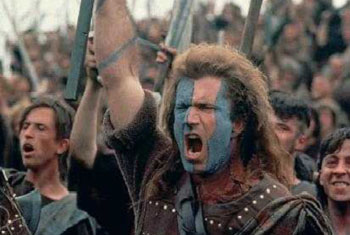There’s a lot to love about Mel Gibson‘s Oscar-winning epic. Set around the end of the 13th century, the film tells the legendary story of William Wallace, a courageous Scottish warrior who led his peers in fighting the tyrannical King of England and his armies. The Scots may be in lesser number, and there are feuds among them, but Wallace ignites their patriotism and their passion and makes them willing to die for their independence. “They may take our lives, but they’ll take our FREEDOM!”
Wallace has reasons of his own to be pissed at the King. Both his father and his wife (played by the charming Catherine McCormack) were gruesomely murdered by English soldiers, leaving him eager to avenge their deaths. Wallace is flamboyantly played by the always enjoyable Gibson, who makes his character into a near-mythical hero with balls the size of Gibraltar. You gotta see Gibson, his hair long and wild, his face painted in blue and his sword up high, leading his troops across the battlefield!
Gibson also directed the picture, and he did an amazing job. The film is grandiose overall, and the combat scenes are particularly impressive. Gibson gathered what seems like thousands of extras dressed in period clothes and armed with various swords, axes, spears and bows, some of them on horses. And then he has them clashing and fighting furiously, with blood spurting everywhere as bones crack and countless men die. And it’s not just scale and excessive gore: the battle scenes are tightly crafted, and we can actually understand Wallace’s warfare strategies.
The film also delivers its share of romance (with Wallace’s wife, and also as he seduces the enemy Princess, played by Sophie Marceau), and there’s a lot said about honor as opposed to treachery, but ultimately this rather simplistic and brutal film owes more to “Conan the Barbarian” than to “Lawrence of Arabia”. This is still a highly entertaining, brilliantly directed flick. I got a kick out of the Scottish landscape, James Horner‘s bagpipes-fueled score and the Scottish accents, and I love Gibson’s performance in front and behind the camera, even though I’m not sure it deserved the Oscar for Best Picture. In any case, “Braveheart” is an awesome film and there is a lot to love about it.
I mean, if it wasn’t clear before, let me insist that the action scenes are great. As in, all-time great. Wallace’s revenge after his wife is killed, that glorious first major battle scene in Stirling, the desperate last stand in Falkirk… And then there’s the climactic torture sequence, that most Mel Gibsonesque of all Mel Gibson sequences.

